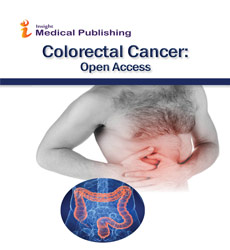Abstract
Immunohistochemical Localization of KRAS and BRAF and its Clinical Utility in Patients with Colorectal Cancer
Background: Colorectal cancer (CRC) is a multistep process occurring due to the accumulation of several genetic alterations. The most important ones are RAS and RAF that have been implicated as key intermediates in RAS-mediated signaling cascade. KRAS and BRAF protein expression levels and prognostic evaluation in CRC patients remains unknown. Moreover, minimal evidence exists regarding the predictive role of KRAS and BRAF for fluoropyrimidine-based adjuvant chemotherapy. Hence, present study aimed to investigate the prevalence of KRAS and BRAF protein expressions in CRC patients and further to correlate the results with clinicopathological parameters and prognosis.
Methods and findings: A total 82 CRC patients were included in this retrospective study. KRAS and BRAF protein expressions were studied by immunohistochemistry technique using paraffin embedded tumor tissue blocks. The data was analyzed using SPSS software. p value = 0.05 was considered as statistically significant. Immunohistochemical localization of KRAS and BRAF showed cytoplasmic staining in 34% and 63% of patients, respectively. BRAF immunopositivity was found to be significantly higher in patients with positive nodal status (p=0.018), presence of perineural invasion (p=0.039) and = 5.0 ng/mL pre-operative serum CEA levels (p=0.008) as compared to their respective counterparts. Moreover, a trend of higher positive BRAF expression was observed in advanced stage patients as compared to early stage patients (p=0.080). Survival analysis demonstrated a significant reduced relapse-free survival (RFS) with KRAS positive expression in rectal cancer patients (p=0.045). Similar trend of reduced RFS was observed with positive KRAS expression in the subgroup of rectal cancer patients treated with adjuvant therapy (p=0.073). However, BRAF protein expression failed to show any prognostic or predictive value in CRC patients.
Conclusion: KRAS and BRAF protein expression might be associated with disease aggressiveness in CRC. Further, KRAS protein expression could be useful prognostic and predictive marker in rectal cancer patients.
Author(s):
Kanik P, Gajjar K and Ghosh N*
Abstract | Full-Text | PDF
Share this

Google scholar citation report
Citations : 92
Colorectal Cancer: Open Access received 92 citations as per google scholar report
Abstracted/Indexed in
- Google Scholar
- JournalTOCs
- China National Knowledge Infrastructure (CNKI)
- Directory of Research Journal Indexing (DRJI)
- WorldCat
- Publons
- International Committee of Medical Journal Editors (ICMJE)
- Secret Search Engine Labs
Open Access Journals
- Aquaculture & Veterinary Science
- Chemistry & Chemical Sciences
- Clinical Sciences
- Engineering
- General Science
- Genetics & Molecular Biology
- Health Care & Nursing
- Immunology & Microbiology
- Materials Science
- Mathematics & Physics
- Medical Sciences
- Neurology & Psychiatry
- Oncology & Cancer Science
- Pharmaceutical Sciences

